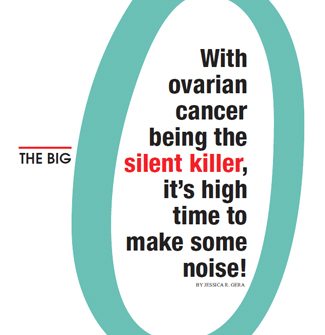
It's called the 'silent killer' for a reason. It, quite literally, sneaks up on you. You have no idea it's there, when it arrived, or how long it has made itself at home. In the simplest terms, it picks a fight with you before you're even aware of its existence. How is that a fair fight?
Ever heard the expression "sucker punch"? A sucker punch is when someone, very cowardly, decides to throw a jab at you from the side or the rear so that you don't know it's coming. You have no time to plan your defense or your attack. There's no time to strategize. Before you know it, you're knocked off your feet and you land on your back with a remarkably hard thud, completely bewildered by what just happened to you. A fair fight is the exact opposite of this scenario. A fair fight allows you to be completely aware that your opponent is coming. You are aware that your opponent is going to try to hurt you, try to make you weak, and try to make you fall. In a fair fight, you have an absolute right to strategize your next move and think one step ahead. A fair fight allows you to put your fists up so that no one can get away with that cowardly sucker punch.
The cowardly opponent that I am referring to is ovarian cancer. According to Ovarian Cancer Canada (OCC), out of all gynaecological cancers, ovarian cancer is the most severe and the risk for developing it increases as you age. Unfortunately, it will give over 2500 Canadian women the fight of their lives, every single year. Of those 2500 diagnosed women, 1700 of them will die—and not because they lost a fair fight.

Ovarian cancer is called the silent killer for a reason. Many women have indeed been sucker punched by this disease because of its silent arrival. In fact, according to OCC, "The symptoms are generally vague, non-specific and can be mistakenly attributed to other causes." It's up to us to break our opponent's silence and make as much noise as possible. It's time to fight fair. We can't do that until we become aware.
Dr. William Mundle, the Chair of the Section of Obstetrics and Gynecology at the Ontario Medical Association, shared some very useful facts that everyone (not only women) should know. There is a common misconception that ovarian cancer can be detected through a Pap test, Dr. Mundle explains. But this is absolutely and positively not true. A Pap test can detect cervical cancer-not ovarian cancer. Dr. Mundle explains that the best thing a woman can do for herself is pay attention to her own body.
"Paying attention to our own bodies and anything that may seem 'out of the ordinary' is our best defence against this disease," explains Dr. Mundle. He continues to state that it is essential to know that there may not be any blatant and obvious symptoms warning you that something may be wrong. You may not get that one red flag ushering you into your doctor's office-but there are silent clues. You just have to listen. Once you hear them, don't wait. Go to your doctor and seek his or her medical expertise. "That's what we're here for!" Dr. Mundle states.
There isn't a person on earth who doesn't suffer from aches and pains from time to time, but when that pain is chronic, you need to speak up and tell your family physician, Dr. Mundle explains. Keep in mind, experiencing aches and pains as well as silent symptoms (chronic or not), does not necessarily mean that something is gravely wrong with you.
So what are those "silent clues"? Ovarian Cancer Canada shares some of the more common and quiet symptoms (see right) of ovarian cancer.
Now, before we all read these symptoms and work ourselves up into a frenzy convincing ourselves that we indeed have ovarian cancer, please remember that according to OCC, you may want to ask your family physician for guidance should these symptoms persist for three weeks or longer.
"Please do not self diagnose," says Dr. Mundle. "We are here to help you and assess you. This is why it is so important to be open with your family physician."
Why is it so important to be aware of these symptoms? "Unfortunately, it's more common that a woman is diagnosed with ovarian cancer in its latter stages (i.e. stage 3) than in its earlier stages," says Dr. Mundle. When detected early and treated, the survival rate is as high as 90 percent, he explains. The moral of the story? Speak up when your body starts giving you some attitude! Don't wait!
It's truly astonishing to see the difference in awareness between illnesses such as breast cancer and ovarian cancer. In a survey completed by the OCC, 96 per cent of women were not able to name some of the most common symptoms of this disease. Twelve per cent actually stated that they didn't know what it was. They had never heard of it. Additionally, 1 in 3 women believed that a Pap test would reveal if they had ovarian cancer.
Our job does not stop at awareness. Ovarian Cancer Canada's largest support program is the annual Winners Walk of Hope. "This is the event that raises us the most funds and creates a huge sense of awareness," says Marilyn Sapsford, the Ontario Regional Manager of the OCC. Sapsford explains that there are a number of other programs that provide support to not only victims of ovarian cancer, but women who have never been diagnosed with this disease. "It is important to be educated," she explains.
To find out more about this disease and OCC's support and awareness programs please visit www.ovariancanada.org.
BY: JESSICA R. GERA / PUBLISHED: MARCH/APRIL 2010 ISSUE














































































































